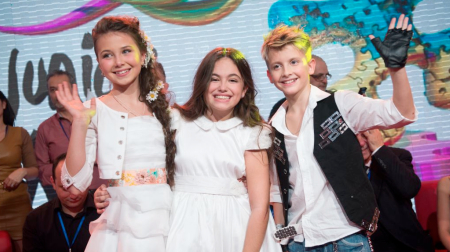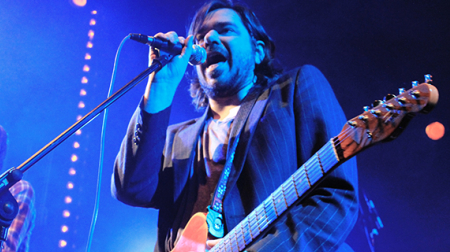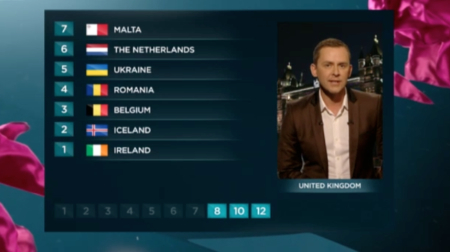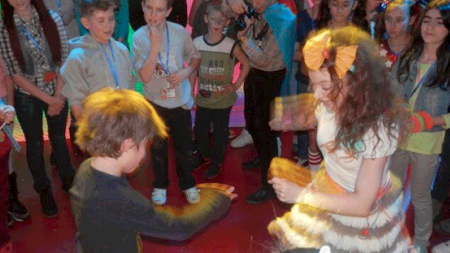The good news is that I’ve woken up two weeks after the 2013 Junior Eurovision Song Contest and Malta has still won the Contest; the show has gathered far more positive comments online than previous Juniors; and I’m not getting flashbacks to a wood panelled commentary box that had the same view of the Ukraina stage as Stadler and Waldorf had of The Muppet Show.
Yes, I’m getting a lot more of a positive feeling about Junior Eurovision after Kyiv than after Amsterdam 2012. However, that doesn’t mean that there isn’t a lot of work ahead for Junior. It’s not yet stable enough to be regarded as an event that ‘always happens’ in the same way as its Adult counterpart, but looking back at our time in Ukraine and looking forward to the next Contest, there is a lot to be optimistic about, and much to take note of.
They Won. They Finally Won
First of all, Malta are going to enjoy themselves. While there’s no automatic right to host, the EBU announced that the JESC winner would now have first refusal on the next year’s Contest, and in effect have preferred bidder status. While discussions are ongoing, every indication is that we’re heading to the Mediterranean Island in November next year, and everyone feels pretty happy about that.

I hope Mum has enough room in the garden for a stage… (picture: EBU)
Don’t discount the impact of a Western winner at Junior Eurovision this year. A number of delegations from non-competing countries were in the Ukrainian audience (both Germany and Hungary were named by Executive Supervisor Vladislav Yakovlev during the EBU press conference), and seeing a Contest where the myth of neighbourly voting did not decide the winner will have been noted.
It might still be too soon to see one of the Big 5 jump into Junior Eurovision, another year of stability and growth might be in order, but some of the smaller countries could well be convinced. As well as Hungary, you would think that a long discussion with the Belgian broadcaster will be a priority.
We Could Put On The Show Right Here!
And then there’s NTU’s production of the show itself. Unlike the adult show in Malmö, the Ukrainian production finished on time. That’s partly down to planning, but also through reactions during the show. Twenty minutes into the production the team knew they were going to overshoot by around four minutes according to their script. So they started to re-write on the fly, and getting back onto the schedule. Now if only we can find some male hosts that didn’t sound like Matt Berry (or failing that, someone just hires Matt Berrry), and the cringe factor from the presenters will drop dramatically.

Matt Berry sings ‘Angely Dobra’ (picture: Music Mafia UK)
With only twelve songs in the Contest there was always going to be a bit more half time show while the votes were being cast and counted, and they put the time to good use, with Junior’s traditional group song followed by an unusual sight at JESC: the winners reprise. The trick of doing a little reprise and then moving into the current hit single was on show as well, but that’s become almost standard practice now (unless you don’t have a hit single, in which case you can sing all of ‘Only Teardrops’).
It still felt a little long. It took just eleven minutes for the first song to take to the stage. Given the two-hour running time, perhaps a bit more show at the start could have mitigated the feeling of the excessive interval acts. That would bring the songs, the voting, and the scoring, closer together in the flow of the show.
Can We Have All Your Votes Now?
Speaking of the voting, I hope DR were watching, because that is how to do it. Okay, there is a slight advantage and logistical simplification by having the kids actually on the stage rather than at the end of a satellite link, but they all managed an introduction, and reading out all ten votes faster than the adults manage. Given the adults only have to read out three votes, this is actually a revelation. Adult should take note and ask what is more important…hearing all the points in the ninety seconds, or having an announcer that insists on doing some comedy schtick or reminding everyone what a wonderful show it was and have you noticed the United Kingdom is hosting the Olympics?

“Hello , Melma!”
But perhaps the biggest lesson to take away from the 2013 Contest is one of targeting and intended audience. It should be clear that the Junior Eurovision Song Contest is not simply the adult show with different age limits. Acknowledging that in all the areas of the show, from the social media presence and online activities to the official videos and the live show itself will give Junior the ability to stand on its own feet. That means there needs to be a decision not just on the age of the performers, but also the age that the TV show is aimed at.
This is necessarily an area of compromise across the continent, as attitudes to Junior Eurovision specifically, and children’s talent shows in general, are not uniform. While NTU’s show worked well for an Eastern audience, I felt that it was geared to an audience that was 11 or 12 years old. There’s an argument that aiming for a slightly older audience (14 to 15?) will increase the appeal of the show to new broadcasters, keep the unique flavour that it has with the old guard, and fans of the Adult Contest can watch in relative comfort.
While those discussions are going ahead, let’s look at the starting time of the Contest. It’s a kids show, so kids really need to be able to watch it, but at the same time there needs to be a large enough audience that the individual broadcasters can have a decent audience for advertisers. Even running an hour earlier, the show wasn’t finishing until 11pm in some countries.
Discovering The True Meaning Of Eurovision
Finally, people ask why Junior Eurovision should continue. There’s actually a lot of reasons, but the biggest one is the same reason the Eurovision Song Contest started in the first place. It’s to bring people together, it’s to share history and culture. it’s to understand each other and realise we are all one.
And one picture, taken at the very end of the week in the Euroclub says it all. It sums up Junior Eurovision- no, it sums up Eurovision. It sums up the dream….

So I thought we could do a UK chat show and call it ‘Light Lunch’ (picture: EBU)
The world is a better place when Armenia and Azerbaijan can dance together.









Very interesting analysis, Ewan. JESC has so much potential and could be here for years to come with the right direction!